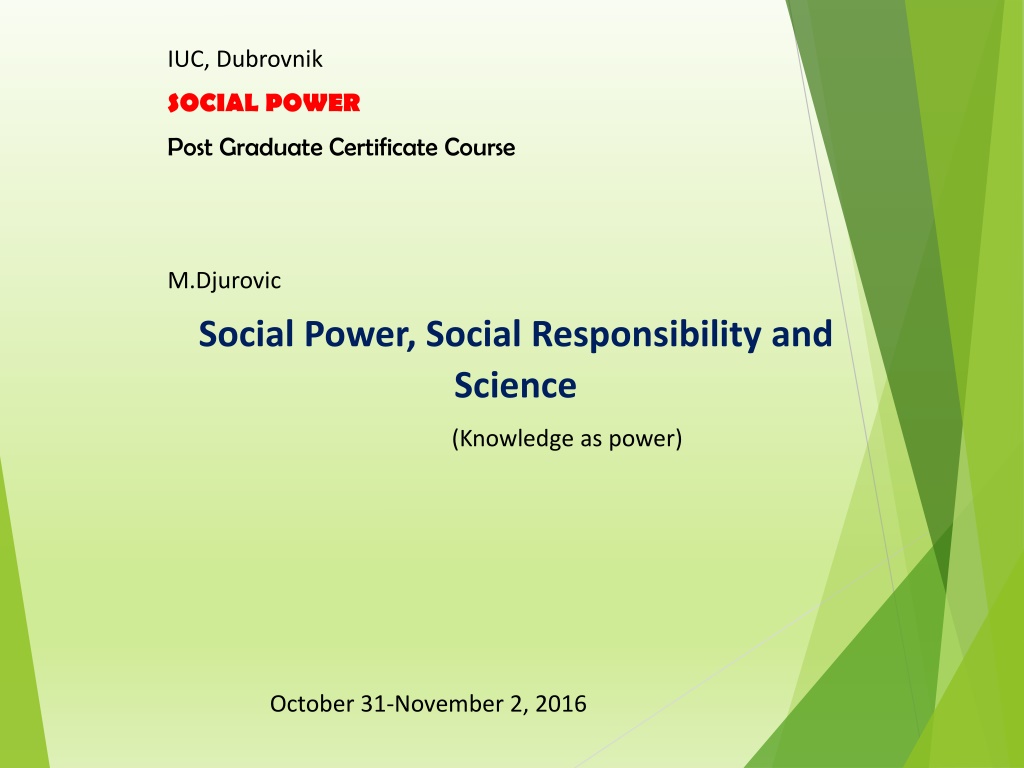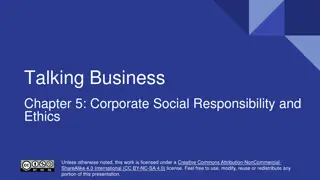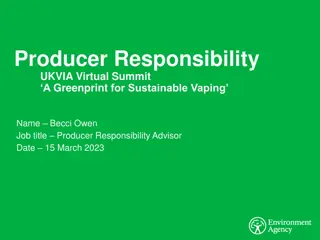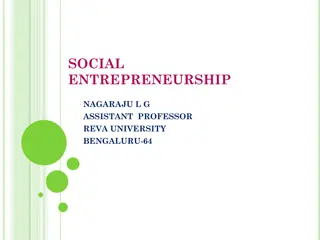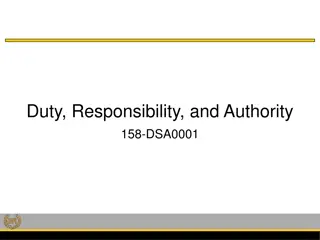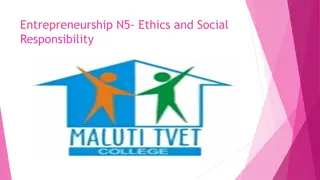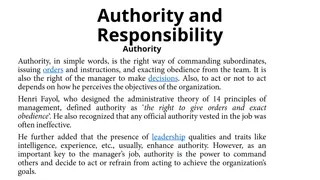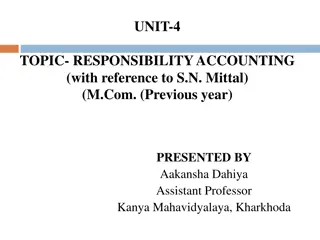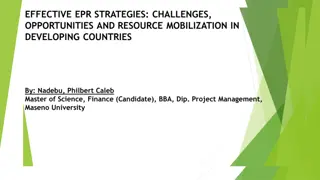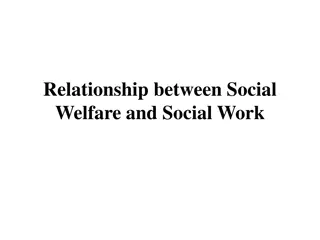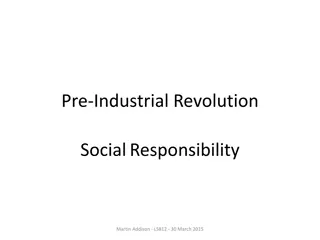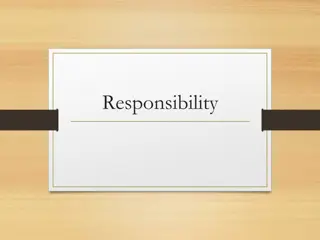The Essence of Social Power and Responsibility
The essence of social power lies in the capacity to produce effects through others, while social responsibility emphasizes the obligation to act for the benefit of society. Explore the dynamics of power types and their impact on social relationships, ethics, and the environment. Discover the interplay between individual capabilities, expertise, and societal influences in shaping power structures and responsibilities.
Download Presentation

Please find below an Image/Link to download the presentation.
The content on the website is provided AS IS for your information and personal use only. It may not be sold, licensed, or shared on other websites without obtaining consent from the author. Download presentation by click this link. If you encounter any issues during the download, it is possible that the publisher has removed the file from their server.
E N D
Presentation Transcript
IUC, Dubrovnik SOCIAL POWER Post Graduate Certificate Course M.Djurovic Social Power, Social Responsibility and Science (Knowledge as power) October 31-November 2, 2016
The essence of social power should be a capacity to produce effects through another self. The social power of a person or business often results in it being copied by others, and such power can typically be credited to the level of the skill, knowledge, information or fame that they possess in a desirable area of expertise. The source of social power is people. It is from people s aspiration, energy, and capacities that society derives its power. When individual capacity is organized and channeled through a system, it becomes social power. In this way, society is a huge reservoir of all our energies, skills, capacities, knowledge, intelligence and aspirations.
Power is fundamentally relative it depends on the specific understandings, recognition of a quality in which one would motivate others to change in the way he intends. French and Raven (1) and later Feldman argue that there are six significant categories of such qualities, while not excluding other minor categories. Reward Power, Coercive Power, Referent Power, Legitimate Power, Expert Power and Informational Power
Reward Power Reward Power is the ability to give rewards when others comply with your wishes. Coercive Power Coercive Power is the opposite of Reward Power. It s the ability to deliver punishments. Referent Power Referent Power is when somebody wants to be like you. You are their reference model. Legitimate Power Legitimate Power is power that comes from a position or role. Expert Power "Knowledge is power." Expert Power is where expertise or knowledge is the source of power. Informational Power Informational Power is the most transitory type of power. Once you give your information away, you give your power away.
The social power is directly related to social responsibility. Responsibility is associated equally to individuals or organizations as well as to ethics. Scientists are often perceived as having a special power and authority. Thus, one of the most important power today is science and technology. Social responsibility is an idea that has been of concern to mankind for many years . Over the last few decades it has become of increasing importance to the business world, named corporate social responsibility. The social power of social responsibility relays on ethics which suggests that an organization or individual has an obligation to act for the benefit of society such to maintain a balance between the economy and the ecosystem. The classical view states that an organization s only social responsibility is to maximize profits. On the other side, there is the socioeconomic view which states that an organization s first responsibility is to maintain and improve the environment in which it conducts its operation; the second is to maximize profits.
Power of the social responsibility can be argued by the need for: Public expectations, Long-run profits, Ethical obligation, Public image, Better environment, Discouragement of further government regulation, Balance of responsibility and power, Shareholder interests, Possession of resources, and Superiority of prevention over cures. At the same time one can argue against the social responsibility because of the following: Violation of profit maximization, Dilution of purpose, Costs, Too much power, Lack of skills, Lack of accountability, Lack of broad public support.
The social responsibilities of researchers arise from the fact that they are carried out in the name of society as an expression and reflection of the society's needs, interests, priorities and expected impacts. The social responsibilities of researchers, often, extend beyond upholding the ethical standards of society (Upsala code) Thus social responsibility is the first and foremost a social, and therefore institutional, issue and power.
Companies have a policy of social responsibility known as corporate social responsibility (CSR), by which. they agree to follow their businesses such to benefit the community at large, being a vital element for business corporations. The most of focus in corporate social responsibility is with regard to the environment. Other areas that should be considered in the development of corporate social responsibility programs are education and health. Today, however, businesses must also reflect on the legal, ethical, moral and social consequences of their decisions . There are several factors which explain the growing interest in corporate social responsibility. The first factor is the new concerns and expectations of citizens, consumers, public authorities in the process of globalization and industrial change. The another factor is the increasing influence of social criteria on the investment decisions of individuals and institutions, as investors or consumers. Furthermore there is the growing concern about environmental degradation If the society is conscious and ethical then businesses are forced to behave responsibly.
Social responsibility and responsible research conduct should be two essential sides of ethical science and therefore social power. Science crosses new borders, and thereby calls fundamental ethical views into question. This focuses on the tension between good and bad uses of scientific concepts, theories and methods what is called "internal." Scientists also have "external" social responsibilities toward the larger community. Research ethics involves the application of fundamental ethical principles where ethics is usually understood as rules for distinguishing between right and wrong. The most researchers are aware of their social responsibilities, but they disagree on how much politics should interfere with their work. In the contemporary world, it became accepted practice that novel research program should include an ELSA component (Ethical, Legal and Social Aspects of Science).
There are two different ideologies when it comes to research and public utility in the scientific community: An ideology of internal control researchers are to judge about the public utility of their research. To make important discoveries, research must be motivated by curiosity. An ideology of external control social actors, such as politicians and organizations determine what research should be done and how. It might become very fashion-driven especially concerning funding of research. The example might be treatment of climate change, nanotechnology, and synthetic biology. The good scientific practice includes the sharing of scientific results with others, whereby everyone, in principle, is able to test, challenge and use scientific results, known under the acronym CUDOS (universalism, communism, disinterestedness, organized sceptism).
Many professional associations, government agencies, and universities have imposed ethical codes, rules, and policies related to research ethics. The following is a rough and general summary of some professional ethical principles, which include: Honesty, Objectivity, Integrity, Carefulness, Openness, Respect for Intellectual Property, Confidentiality, Responsible Publication, Responsible Mentoring, Respect toward colleagues and treating them fairly, Social Responsibility, Non-Discrimination, Competence, Legality, Animal Care, Human Subjects Protection.
Behind the ethical codes there are a code of practice (code of professional responsibility) which are usually adopted by a profession or by a governmental or non-governmental organization to regulate that profession. Listed below are a few examples of professional codes (Society of Professional Journalists (SPJ), and Public Relations Society of America (PRSA)). Minimize Harm (Honesty); Proper Conduct (Patience); Show Loyalty (Faithfulness); Act Independently (Courage); Act Independently (Independency). Many international treaties, agreements, declarations, and judgements intend to regulate the ethical process of scientific research and development such influencing social power. For example, in his book Hope in a Dark Time: Reflections on Humanity s Future, David Krieger has collected a number of declarations and statements that treat different aspects of ethical dilemmas that have emerged from the techno-scientific development. The declarations and statements included in Krieger s book are the following (13): Universal Declaration of Human Rights (adopted by United Nations General Assembly, 1948), The Declaration of a Global Ethics (discussed at the Parliament of the World s Religions in Chicago, 1993), The Earth Charter (formally launched in 1991), The Russell-Einstein Manifesto (the moral foundation of the Pugwash conferences), Appeal to End the Nuclear Weapons Threat to Humanity and All , Charter of Human Responsibilities, Groningen Manifesto.
The ethics and morals might be seen the same to many. While moral define personal character, ethics stress a social system in which those morals are applied. In other words, ethics treats standards or codes of behavior expected by the group to which the individual belongs. Thus ethics, as a part of social power, can be differently defined for different groups. Such scientists working at universities are guided by codes of academic science. The Danish philosopher Hans Fink has formulated the ethos of the university (17). It consists of five principles: Close connection between research and university education, Freedom of research, Freedom of teaching, Self-governance, The unity of science.
Presently, the focus of US ethics education in science and engineering tends to be on the individual and the responsible conduct of research (19), or microethics, what has been criticized because it is insufficient since it does not adequately recognize the larger societal context of which research is a part. In Europe, ethics education in science and engineering is grounded firmly on the macroethical approach, the concept of social responsibilities of scientists and engineers (19). European institutions of higher education has adopted an overarching educational framework that highlights social responsibility (20). That includes (EHEA) the expectation that all graduates "have the ability to gather and interpret relevant data to inform judgments that include reflection on relevant social, scientific or ethical issues" (at the bachelor's level) and "have the ability to integrate knowledge... and formulate judgments ... that include reflecting on social and ethical responsibilities linked to the application of their knowledge and judgments" (at the master's level), and "communicate with their peers ... and society in general about their areas of expertise" (at the doctoral level). Many would like to see more core ideas integrated into graduate education, with their mission in a social power, while scientists should appreciate the global dimension of science. The coverage of science in the media has a major role in shaping the public's perception of science and its social power. Although most scientists are reluctant to talk to the media, there is agreement that scientists contributed significantly that science is effectively reported in media. Scientists obviously have the responsibility for helping the public to understand scientific issues and therefore their power. This can be done in many ways, but all require that scientists communicate in clear, understandable ways, working with journalists such to educate public so that they can appreciate the significance and power of the scientific enterprise.
Power of knowledge Progress could not have taken place without science, There doubt about the increased social significance of science i modern society. Knowledge, ll types of knowledge including strict scientific knowledge, are not per se self-revealing. Like technology, knowledge cannot regarded as deus machina to be called u to solve the social problems that it has very often itself created. Like technology, scientific knowledge is essentially perfection without purpose. Thus, the basic questions to ask are: Knowledge from whom? For what? We are thrown back to the underlying problem of power and its substantive legitimacy and its value orientation. Science clarify the issue, calculate the relative costs of the various alternative courses of action, show the best ways of implementation. But it cannot take away from us the human responsibility of choice and decision.
Epicurus remarked that science is important because only science can give us happiness. In his letter to Pythocles, Epicurus says that being able to explain phenomenon is more important than its actual occurrence. Friedrich . von Hayek sees the Industrial Revolution as the manifestation of trend i which science and technology, but particularly science, become the reference for ll human knowledge and for any moral obligation. Federico Mayor remarks, we live in age where science daily demonstrates its power. The knowledge it has given us has conquered distance, abolished want, reduced disease and opened doors to understanding the mysteries of nature But this indispensable interaction between science and politicians can flourish only in free and democratic societies. Power today exploits and oppresses not the use of direct action, but simply ignoring, failing to intervene, refusing to take action, taking refuge behind complex and perfectionist procedures through which legal formalism and political paralysis support each other. Scientists, too, should have greater sensitivity towards the social and political impact of their advice.
Science has m group enterprise and an organizational weapon of deeply influencing the political power structure, the econom system of production and the overall social and intellectual climate.
What has to understood is the new social function of science and of technology as applied scientific knowledge. We still talk and think i eighteenth-century philosophical, n mi and political terms from capitalism to socialism - and do t realize that the new social realities longer accommodated within these categories. The ideological conceptual framework of the eighteenth century is obsolete. It must realized that science, scientific knowledge and technology as applied science are the new faces of social and political power.
Science and scientists often serve the existing powers. But i so doing, they change the nature of power and those who wield it. h very source of power and the ways i which power is being exercised are more and more deeply affected science and technology. Today's advanced societies are therefore essentially characterized the all-pervading power of scientific knowledge. From historical point of view this is w phenomenon. Its consequences society as whole and science itself are interesting but not easily etectable or fully understandable. Science is being used as polemical weapon against rivals and competltors. It is different story when science works for the government or for an international agency, sponsored various governments. Then strange paradox seems to take l . Science is undoubtedly tool of government, but at the same time government and its power are somehow coerced into its service. Between science and power curious master- servant relationship develops. has to go back to Hegel: <The servant serves his master but serving his master the servant little little empties it, makes him devoid of original initiative like absentee owner, reduces him to pure facade and finally replaces him>. Government grants m to science to achieve certain goals, to conduct research with knowledge of technical details and procedures and therefore lacking effective control. Thus, science the end dictates to government what to do, how, and how fast. No control is possible without actual knowledge. In the end, policy- makers, despite ll their rhetoric, are powerless when squarely faced scientists.
The education must be viewed as a basic human right, as a value in and of itself, and reviews the evidence on how education builds the human resources that individuals and nations need to be productive, to continue to learn, to solve problems, to be creative, and to live together and with nature in peace and harmony.
Educational need to be (or remain) concerned with: (1)the manifestation of power; (2)the entanglement in the constitution of power structures; and (3)the order of knowledge and presentation that is appropriate for power analyses. The power does not (only) lie in the restrictions of institutions and rules, but also in the binding nature of pedagogical ideals and images, i.e. in elements that we usually appreciate.
Education makes people easy to lead, but difficult to drive; easy to govern, but impossible to enslave. Henry Peter, Lord Brougham "The Present State of the Law" "If a man empties his purse into his head, no man can take it away from him. An investment in knowledge always pays the best interest. Benjamin Franklin "Enlighten the people generally, and tyranny and oppressions of body and mind will vanish like evil spirits at the dawn of day. Thomas Jefferson "The educated differ from the uneducated as much as the living from the dead. Aristotle Robert Maynard Hutchins The Political Animal "Education is a better safeguard of liberty than a standing army. Edward Everett "Learned Institutions ought to be favorite objects with every free people. They throw that light over the public mind which is the best security against crafty & dangerous encroachments on the public liberty. James Madison "Education is a companion which no misfortune can depress, no crime can destroy, no enemy can alienate, no despotism can enslave. At home, a friend, abroad an introduction. In solitude, a solace, and in society, an ornament. It hastens vice, it guides virtue; it gives, at once, grace and government to genius. Without it, what is man? A splendid slave, a reasoning savage." James Addison " I can not think of no more valiable asset to our country then the frendship of future world leaders who have been educated here ".( Soft powe r) Colin Power, former US secretary)
Conflict between science and ideology Giordano Bruno s bonfire in 1600, guilty for the plurality of worlds Galileo Galilei 1564-1642 guilty of Copernicanism Soviet Union in the Stalin era Genetics reactionnary bourgeois science Lyssenko inheritance of acquired characteristics Vavilov, a great geneticist, arrested, sentenced to death penalty and dies in prison in 1943 ....
Is that all behind us ? Unfortunately no: there are constant attacks against science Climate change Evolution of living species and against scientists guilty of rational thinking rather than being followers of dogmas.
But why? Because education and science introduced a source of understanding the world not based on the ideology of the rulers. Conflict happens because of opposition between knowledge versus dogmas, beliefs, ideologies
, much more social power than it has been recognized. science has
Thank you On attention !
